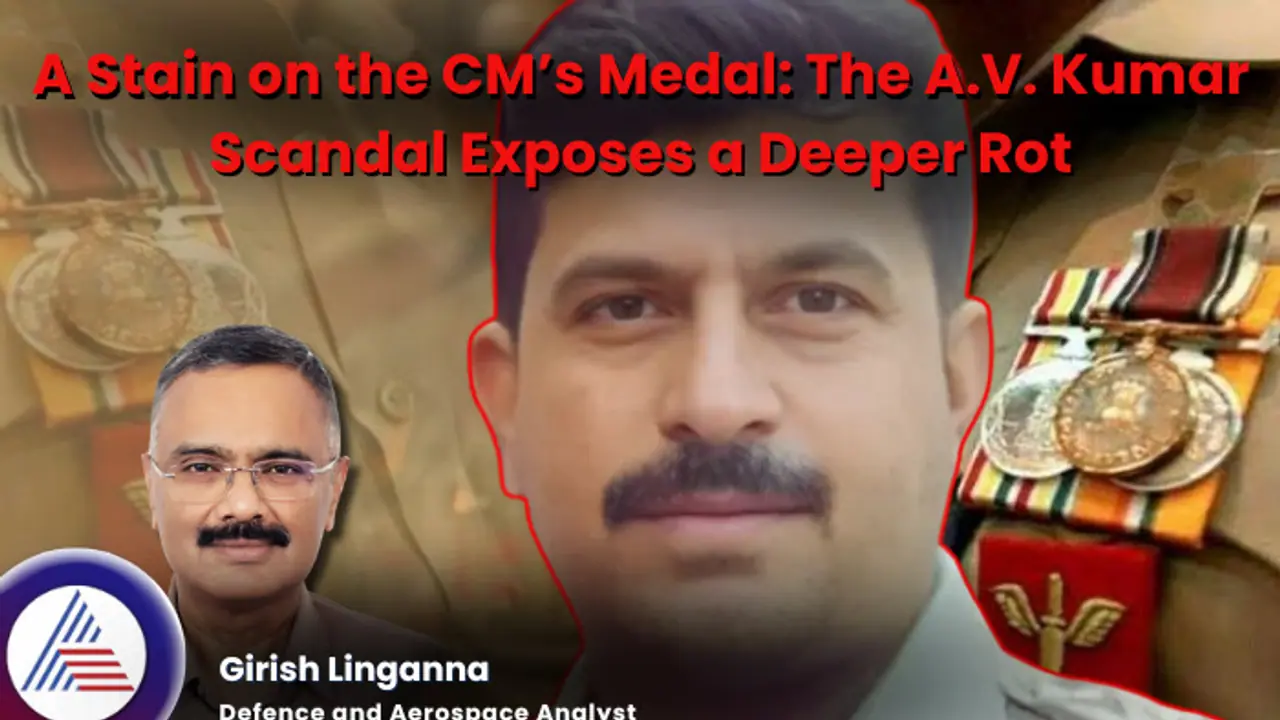The A.V. Kumar scandal exposes deep-rooted corruption in Bengaluru’s police force, highlighting failures in award vetting, political influence, and the urgent need for systemic reforms.
The scandal surrounding Bengaluru police inspector A.V. Kumar has turned what was meant to be an occasion of honor into a symbol of embarrassment. A man facing serious allegations of corruption and land-related malpractice was set to receive the Chief Minister’s Gold Medal—a reward meant for integrity and excellence. But instead of stepping onto the stage, Kumar slipped into hiding after Lokayukta officials raided his properties on Tuesday night. Posted at the Annapoorneshwari Nagar Police Station, Kumar’s disappearance just before the ceremony has turned the entire process into a mockery, dragging the Chief Minister’s name into an avoidable controversy.

The more troubling question, however, is not about Kumar alone—but about the senior officers who recommended him. From ACPs and DCPs to the Commissioner and even the DGP—if a committee was involved in the selection—then every level must come under scrutiny. A series of officers either blindly or deliberately endorsed someone with a dubious track record. This raises a serious concern: how did such glaring misconduct escape the vetting process? Was it pure negligence—or an intentional cover-up?
What makes this scandal even more disturbing is that A.V. Kumar had served as the Assistant Investigating Officer in the high-profile Darshan case. This very fact now demands a re-examination of his role in that investigation. If a man accused of real estate rackets was closely handling such a sensitive case, the public deserves to know whether justice was compromised. Can we be sure his hands were not greased there too? This isn’t just about corruption—it’s about potential tampering with the course of justice. The Darshan case must now be revisited with a magnifying glass to ensure there was no manipulation or misconduct under Kumar’s watch.
Let’s also address the elephant in the room—Kumar’s posting to Annapoorneshwari Nagar wasn’t mere coincidence. Local political influence, particularly from the area MLA and other vested interests, appears to have played a role. While they may not have been the ones to propose his name for the award, their role in positioning him in a strategic location with potential for misuse of power should be scrutinized. Political backing often comes with expectations—and it's important to ask, what favours were exchanged?
Also read: Gen Thimayya and Manekshaw: Shadows of Duty in Political Crossfire
Karnataka Home Minister G. Parameshwara’s revelation that Kumar was conducting real estate meetings right within the police station is not just shocking—it confirms that this was no isolated act of corruption. It suggests an organized misuse of authority, likely enabled by both political and administrative indifference.
But the immediate spotlight must remain on the recommending officers. The process that allowed Kumar’s name to reach the Chief Minister’s desk is fundamentally flawed. This is not a minor lapse—it’s a failure that damages public trust and dishonors the spirit of the medal. An urgent and thorough probe is necessary into how his name was cleared, who was responsible, and what background checks were ignored.
The Chief Minister’s name and the dignity of the medal cannot be allowed to be misused in this manner. Accountability must begin at the top, and extend all the way down. Those who allowed this farce to happen must be made answerable—through inquiry, disciplinary action, and systemic reform.
This must be the turning point—where merit, not manipulation, determines recognition. Otherwise, such medals will continue to lose their meaning, and with them, the public’s trust in our institutions. Even more unfortunate is that it also casts doubt on the honest and deserving officers who have earned these awards through hard work and integrity. Their achievements risk being overlooked or questioned because of the system’s failure to uphold its own standards.
(Girish Linganna is an award-winning science writer and a defense, aerospace, and political analyst based in Bengaluru. He is also the Director of ADD Engineering Components, India Pvt. Ltd, a subsidiary of ADD Engineering GmbH, Germany. You can reach him at: girishlinganna@gmail.com)
